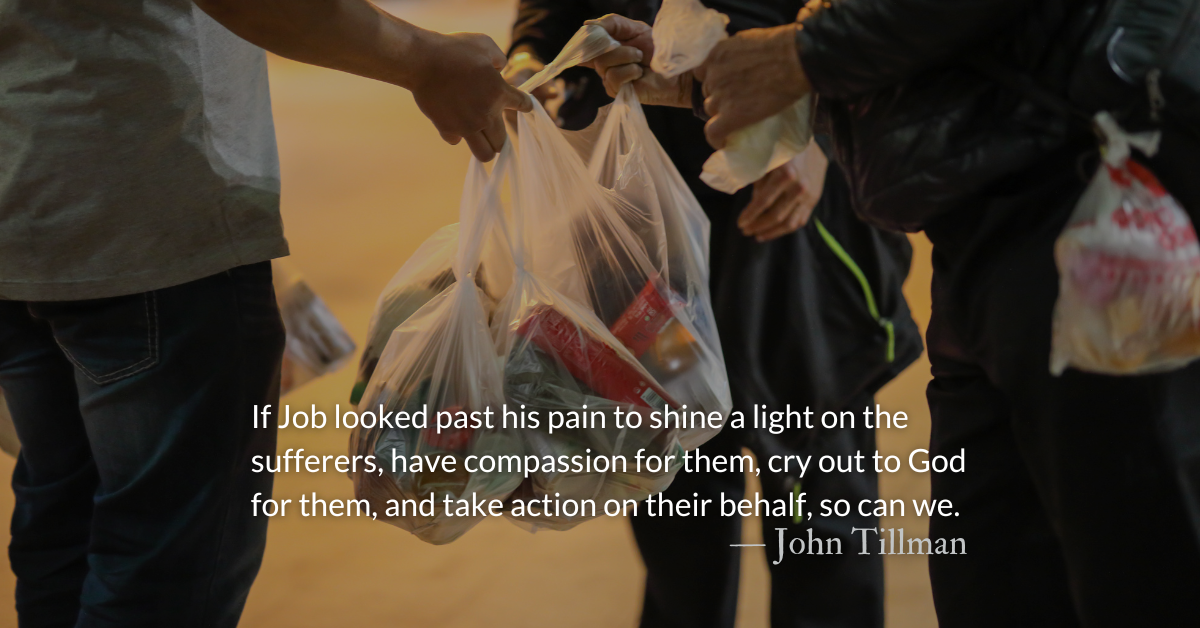Scripture Focus: Job 24.1-12
1 Why does the Almighty not set times for judgment?
Why must those who know him look in vain for such days?
2 There are those who move boundary stones;
they pasture flocks they have stolen.
3 They drive away the orphan’s donkey
and take the widow’s ox in pledge.
4 They thrust the needy from the path
and force all the poor of the land into hiding.
5 Like wild donkeys in the desert,
the poor go about their labor of foraging food;
the wasteland provides food for their children.
6 They gather fodder in the fields
and glean in the vineyards of the wicked.
7 Lacking clothes, they spend the night naked;
they have nothing to cover themselves in the cold.
8 They are drenched by mountain rains
and hug the rocks for lack of shelter.
9 The fatherless child is snatched from the breast;
the infant of the poor is seized for a debt.
10 Lacking clothes, they go about naked;
they carry the sheaves, but still go hungry.
11 They crush olives among the terraces;
they tread the winepresses, yet suffer thirst.
12 The groans of the dying rise from the city,
and the souls of the wounded cry out for help.
But God charges no one with wrongdoing.
“If you aren’t intensely concerned for the quartet of the vulnerable…it’s a sign your heart is not right with God.” — Tim Keller
Reflection: Vulnerable Quartet
By John Tillman
The “quartet of the vulnerable” is a term for those vulnerable to harm, particularly in the Bible: the widow, the orphan, the immigrant, and the poor.
Job sees wrongs in his community, questioning why God has not acted on behalf of three of these four groups. He shines a light on the sufferers and has compassion for them.
Job starts with the subtle crime of moving boundary stones. Doing this made one’s land more profitable and incrementally stole influence and livelihood from neighbors.
An action in Job’s list that particularly infuriates me is driving away the orphan’s donkey. Driving away the donkey is an act of financial sabotage, equivalent to breaking a farmer’s tractor or burning down their barn. It is intended to cause bankruptcy, loan default, and desperation. It cuts their bootstraps to prevent them from pulling themselves up, ensuring that there is no escape from poverty and enslavement.
Another wrong Job lists is sending “the poor of the land into hiding”, forcing them into deserts where there is no food for their children. (Job 24.4-5) These wrongs make me think of current issues.
When we look honestly at our society as Job did, can we not see those incrementally “moving boundary stones” stealing wealth and influence from their neighbors? Can we not see those financially and educationally sabotaging people working to escape poverty? Can we not see those sweeping the poor out of sight or allowing them to languish and die?
Laws have been opposed and defeated to help the poor or penalize financial crimes. Programs or money that would feed hungry children have been attacked or eliminated. Churches, programs, or pastors who help the poor or migrants have been criticized, intimidated, fined, and prosecuted for doing so.
What kind of society does these things? Not a great one. Not a righteous one. God judges the righteousness of kings, countries, and cities by the condition of these groups. God is concerned for the welfare of this vulnerable quartet. We should share his concern.
Job began this section with despair that these things were happening. We may identify with that despair. Job ends this section with certainty that God will destroy and punish abusers of the vulnerable.
If Job looked past his pain to shine a light on the sufferers, have compassion for them, cry out to God for them, and take action on their behalf, so can we.
Divine Hours Prayer: A Reading
Jesus taught the disciples, saying: “Look, I am sending you out like sheep among the wolves; so be cunning as snakes and yet innocent as doves. Be prepared for people to hand you over to sanhedrins and scourge you in their synagogues. You will be brought before governors and kings for my sake, as evidence to them and to the Gentiles. But when you are handed over, do not worry about how to speak or what to say; what you are to say will be given to you when the time comes, because it is not you who will be speaking; the Spirit of your Father will be speaking in you.” — Matthew 10.16-20
– From The Divine Hours: Prayers for Summertime by Phyllis Tickle.
Today’s Readings
Job 24 (Listen 2:56)
Psalm 3-4 (Listen 1:56)
Read more about Taking Advantage of the Desperate
Economically disadvantaged neighborhoods often contain payday lenders and abortion clinics, but few doctor’s offices or grocery stores—monetization of desperation.
Read The Bible With Us
It’s not how quickly you read the Bible. It’s how well you live it out. Join our sustainable, two-year Bible reading plan and get more out of each page.






